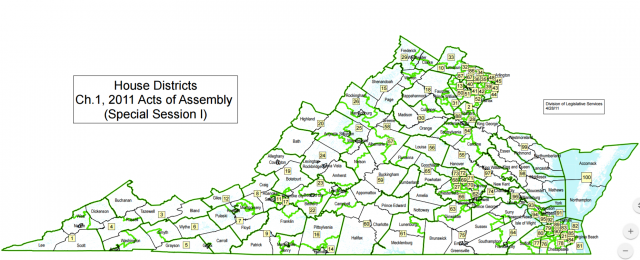The Supreme Court today ruled that the current lines for Virginia House of Delegates districts are unconstitutional.
While this decision will be considered by many to cause a great political disruption in Virginia, I believe it actually creates a simple way for the legislature to keep the same lines in place.
In the case of Bethune-Hill v. State Board of Elections, the Supreme Court ruled almost unanimously that the current district lines are unconstitutional because they were created based primarily on the race of the people within the districts. The Court ruled that making race the primary consideration was a violation of the Equal Protection Clause of the Constitution.
The Court went on to reject the argument made by the Commonwealth that the lines meet constitutional muster because they would have been acceptable even if race had not been the primary rationale. The Court tacitly acknowledged that these lines might have been acceptable under a different rationale but said that the constitutionality of the lines is determined based on the legislature’s stated purpose at the time they were adopted.
In the words of the Justice Kennedy’s majority opinion:
“The State also contends that race does not have a prohibited effect on a district’s lines if the legislature could have drawn the same lines in accordance with traditional criteria. The proper inquiry, however, concerns the actual considerations that provided the essential basis for the lines drawn, not post hoc justifications that the legislature could have used but did not. A legislature could construct a plethora of potential maps that look consistent with traditional, race-neutral principles, but if race is the overriding reason for choosing one map over others, race still may predominate.”
In other words, the lines that were overturned were deemed unconstitutional because the legislature’s primary basis in drawing them was race, but the exact same lines very well might be acceptable if race is not the primary basis for the legislature adopting them.
It seems to me, therefore, that notwithstanding today’s decision, the current lines could potentially remain in place and survive a future court challenge if the legislature simply passes a bill with the same lines but gives a constitutionally valid rationale for them that does not make race the primary concern.
Author: Ken Falkenstein
Ken Falkenstein is the Managing Editor of Committed Conservative and brings a wealth of experience and expertise in public affairs to the job. Ken served in the U.S. Army in the last years of the Cold War as a Russian linguist for military intelligence and the NSA. After leaving the Army, he earned his degree in Secondary Education from Old Dominion University, where he also wrote a popular column in the student newspaper.
Upon graduation, Ken worked as a Legislative Aide to two Republican members of the Virginia House of Delegates. Ken also served as Corresponding Secretary of the Young Republican Federation of Virginia, managed several successful political campaigns, and managed governmental affairs operations for a local Realtor association.
In 1995, Ken moved to Washington, DC to serve as a Legislative Assistant to Sen. John Warner (R-VA). While working for Sen. Warner, Ken attended law school at night, earning his J.D. with honors from the George Mason University School of Law (n/k/a The Antonin Scalia Law School). Since that time, Ken has practiced as a civil litigation attorney, including serving for three years as an Associate City Attorney for the City of Virginia Beach, Virginia.
Ken previously was a contributor to the highly-regarded political blog Bearing Drift and was a weekly co-host of The Steve Batton Radio Program. In 2016, Ken ran unsuccessfully for the Virginia Beach School Board. Ken is also a former President of the Down Syndrome Association of Hampton Roads.
Ken now lives outside of Denver, Colorado with his wife, Kim, and three sons, Adam, Dylan, and Joshua, who has Down syndrome. Ken’s writing is motivated and informed primarily by his concern for his kids’ future.
































